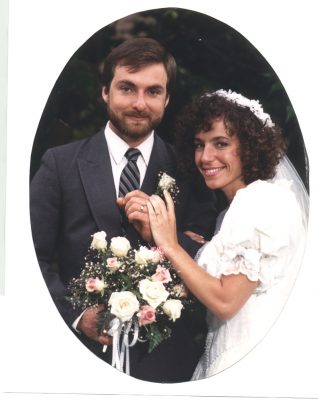
My wife, Mary, and I will be married for 36 years on June 4, and during this time I’ve noticed that marriages fall roughly into three categories. These categories aren’t fixed, but I do see patterns of all three all the time. I find this interesting because it helps me to see where I could improve and why some marriages seem like heaven while others seem like hell, and many in between. The three-marriages perspective highlights why some marriages thrive and others are a burden some cannot bear. Perhaps you’ll find these ideas helpful, too.
The Beautiful Marriage
Ideally, a marriage is a partnership between two people who pledge to put the other person first in all things. That’s what all traditional marriage vows portrayed, and this was widely recognized in times past. When two people put their spouse first, both get what they need in a beautiful way. This never happens perfectly, of course, but it is a wonderful ideal that some couples do achieve.
The thing is, few people seem to enter marriage with a giving attitude in mind, and this isn’t surprising. It seems to me that many newlyweds are too immature (either chronologically or functionally) to see things this way when they first get married, but without exception that I’ve seen it’s essential for any marriage that is to be all it should be. I see few marriages that could be called truly “beautiful” all the time, and the beautiful marriage seems to be getting more rare as time goes on. This is also not surprising because the level of selfishness is rising sharply in our world and across all age groups. But that’s another story . . .
The Heroic Marriage
Selfishness is the natural tendency of the human heart, and this is understandable. We all come into this world a bundle of wants and desires. No infant is capable of intentionally serving others, but a big part of maturing is coming to a selfless perspective. When one partner in a marriage is committed to putting the other person first, but the other does not reciprocate, that’s heroic. From time to time even people involved in a beautiful marriage will sometimes lapse into selfishness that leads to heroism on the part of the other, and this too is understandable. Marriage has its seasons. None of us is perfect, though people who aim to grow in love as a central part of their personality will tend towards selflessness over time. It’s a consistent obedience in the same direction for them.
Now, before I go on, I’m not advocating sticking with a live-in relationship that’s physically dangerous. The word that comes up in cases like this is usually “abuse”. And while the concept of physical abuse is certainly real, the word “abuse” is also completely open to abuse itself. It’s like the word “dysfunctional” in that it can mean whatever anyone wants. It’s all connotation and very little solid meaning. If a person becomes fed up with life in a heroic marriage, it’s almost inevitable that the phrase “emotional abuse” will come up in some form. It’s convenient and useful as a reason to give up because there are no clear-cut boundaries or definitions of what abuse is. In some cases this abuse will be a legitimate reason to give up, but certainly not in all cases.
And while it’s easy to see the attraction of a beautiful marriage, why put up with a heroic one? If your perspective is only about the here-and-now, about your current biological life and nothing more, sticking with a heroic marriage makes no sense. It’s just a foolish waste of time and life, right? Life is too short for this kind of thing, some say.
But what is the purpose of life, anyway? Does it even have a purpose? And further, if some purpose is present, what role does marriage play in it?
As far as I can tell right now, marriage has several purposes besides helping to ensure a solid starting point for children. I’d also argue that improving the human hearts of those that are married is a big one. Improvements of this sort make no sense if you believe your inner heart dies and rots with physical death. But that’s a relatively recent and modern view, and one that often leads to despair and pointlessness in the end. After all, if we’re just random collections of molecules, living in a random and pointless universe, there’s not a lot to work with beyond simply finding pleasure.
Do you know the popular TV series The Crown? It’s about the British royal family, including the coronation of a young Queen Elizabeth and her marriage to Prince Phillip. The life stories portrayed in The Crown offer an excellent view of two kinds of marriages. From what I know about Queen Elizabeth and Prince Philip, I would argue that they had a heroic marriage. Philip’s infidelity in their early marriage was well-know to Elizabeth yet she stuck with it. She had every reason to consider herself abused. If the show is any indication of reality, Philip’s interests in his own self, at least early on in the marriage, was obvious. Elizabeth’s commitment to the marriage, and to carry out her duty as sovereign and to the God that she acknowledged was part of the ceremony, was one of the most remarkable examples of selflessness that I’ve seen. This was no-doubt a function of her faith which was strong and foundational for her. Now that Elizabeth is gone, I see her life legacy as one of the most impressive I know. I often think of her in times of challenge. But once again, whether you think this is wise or foolish depends entirely on what you believe the point of life and marriage is, or even if there is a point.
The Tragic Marriage
The Crown also provides a great example of a tragic marriage, and this is what we see with Prince Charles and Lady Diana. And while it’s obvious to me that Diana could probably have thrived as a wife and Princess if Charles had given her emotional support and true love (especially early on in marriage). It seems that he was incapable of doing that with Diana who seemed to be incapable of giving anything in return. For Charles, it was all about what he got out of his relationships, and this is something that his lover and mistress, Camilla, provided him with early on and presumably still does today.
To be fair, most of what I know about Charles and Diana comes from a dramatization of their lives, and like I always tell my kids “never get your historical perspective from movies and TV shows. Never.” But whether the portrayal of Charles and Diana’s marriage is empirically accurate doesn’t really matter for our purposes here. Their lives on the screen serve as a classic example of how two people who seem intent on “taking” rather than “giving” – the essential feature of a tragic marriage. And as you’d fully expect, their marriage was truly tragic on several levels. That certainly is empirically true.
In practice, most marriages are probably a combination of beautiful, heroic and sometimes tragic, but I find the entire concept useful to gauge where I’m at and how I’m doing. When it comes to marriage, all any of us can ever do is manage ourselves. I’ve never found it useful to think of my wife in terms of how she’s doing. It’s tempting, certainly, but not helpful for the simple reason that we can’t legitimately control the hearts of other people. It’s beyond our control.
What is Love?
All of this comes down to our ideas of love. If “love” is about fond feelings and personal satisfaction, then that’s one thing. None of what I’m offering here makes much sense from that perspective. But if a person believes that love is about giving (whether any “receiving” happens or not), that’s another thing entirely. Same word, but entirely different concepts. Perhaps one of the biggest tragedies of our time has been the redefinition of “love” as being fond feelings for “the person we were meant to be with”. As far as I can tell, this is one of the big injustices fousted on the world by Hollywood.
 If this article has proven useful to you, then great. If not, then feel free to ignore it. Not everything resonates with everyone all the time. Please consider helping me cover the cost of producing and publishing content like this. Click the “buy me a coffee” button below for a safe, simple and fast way to make a contribution. Thank you!
If this article has proven useful to you, then great. If not, then feel free to ignore it. Not everything resonates with everyone all the time. Please consider helping me cover the cost of producing and publishing content like this. Click the “buy me a coffee” button below for a safe, simple and fast way to make a contribution. Thank you!
– Steve Maxwell



